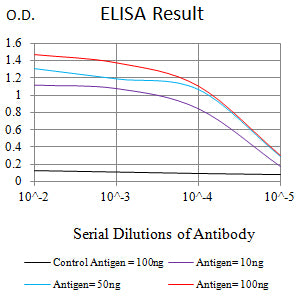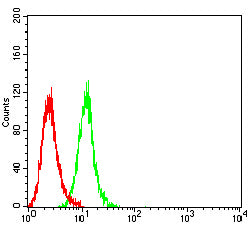

| WB | 咨询技术 | Human,Mouse,Rat |
| IF | 咨询技术 | Human,Mouse,Rat |
| IHC | 咨询技术 | Human,Mouse,Rat |
| ICC | 技术咨询 | Human,Mouse,Rat |
| FCM | 1/200-1/400 | Human,Mouse,Rat |
| Elisa | 1/10000 | Human,Mouse,Rat |
| Aliases | UV20; COFS4; RAD10 |
| Entrez GeneID | 2067 |
| clone | 3F9E9 |
| WB Predicted band size | 32.6kDa |
| Host/Isotype | Mouse IgG1 |
| Antibody Type | Primary antibody |
| Storage | Store at 4°C short term. Aliquot and store at -20°C long term. Avoid freeze/thaw cycles. |
| Species Reactivity | Human |
| Immunogen | Purified recombinant fragment of human ERCC1 (AA: 1-120) expressed in E. Coli. |
| Formulation | Purified antibody in PBS with 0.05% sodium azide |
+ +
以下是3篇关于ERCC1抗体的代表性文献及其摘要概述:
1. **《ERCC1 expression as a prognostic and predictive biomarker in non-small cell lung cancer》**
*作者:Olaussen KA 等(2006)*
摘要:该研究发现ERCC1蛋白低表达的肺癌患者对铂类化疗反应更佳,且生存期更长。研究通过免疫组化(IHC)分析ERCC1抗体检测的临床价值,证实其可作为铂类药物疗效的预测标志物。
2. **《Validation of ERCC1 antibodies for immunohistochemistry: Testing towards clinical use》**
*作者:Friboulet L 等(2013)*
摘要:研究比较了多种市售ERCC1抗体的特异性,发现多数抗体存在交叉反应性问题。通过质谱验证,提出克隆8F1在检测ERCC1异构体时特异性较高,强调抗体选择对临床诊断结果的关键影响。
3. **《ERCC1 and RRM1 in the COSMIC cancer database: Molecular biomarkers of drug resistance》**
*作者:Rosell R 等(2012)*
摘要:通过分析癌症基因组数据,结合IHC和qPCR检测,发现ERCC1高表达与铂类耐药相关。研究建议标准化ERCC1抗体检测流程以优化个体化化疗方案,并探讨了其与RRM1的联合预测价值。
ERCCl (Excision Repair Cross-Complementation Group 1) is a critical protein in DNA repair mechanisms, particularly in nucleotide excision repair (NER) and interstrand crosslink (ICL) repair. It forms a complex with XPF endonuclease (ERCC1-XPF) to cleave damaged DNA strands, enabling error-free replication. Due to its role in maintaining genomic stability, ERCCl expression is closely linked to cancer progression and therapeutic response. For instance, low ERCCl levels are associated with enhanced sensitivity to platinum-based chemotherapy (e.g., cisplatin), as these drugs rely on DNA damage to kill cancer cells. Conversely, high ERCCl expression may indicate resistance to such treatments.
ERCC1 antibodies are essential tools for detecting and quantifying ERCCl protein expression in research and clinical settings. These antibodies are widely used in immunohistochemistry (IHC), Western blotting, and ELISA to evaluate ERCCl as a predictive biomarker in cancers like non-small cell lung cancer (NSCLC) and ovarian cancer. However, variability in antibody specificity (e.g., clone 8F1 vs. 4F9) has raised concerns about reproducibility across studies, emphasizing the need for standardized validation protocols. Recent studies also explore ERCCl's potential as a therapeutic target, with inhibitors under investigation to overcome chemotherapy resistance. Understanding ERCCl's functional dynamics through antibody-based assays remains pivotal for advancing personalized oncology.
×